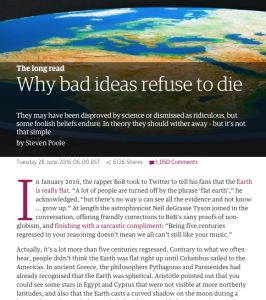Rejoignez getAbstract pour lire le résumé !

Rejoignez getAbstract pour lire le résumé !
Steve Poole
Why Bad Ideas Refuse to Die
The Guardian, 2016
Aperçu
How do long-refuted theories and ideas re-emerge and thrive in public discourse?
Recommendation
People can stubbornly cling to false theories and wrong information – in science as much as in everyday life. Steven Poole, author of Rethink: The Surprising History of Ideas, argues persuasively that the reason behind the persistence of nonfactual, often long-disproved ideas isn’t necessarily ignorance. He presents the good and bad effects of “zombie ideas” in both academic and public discourse. getAbstract recommends this article to scientists, conspiracy theorists and anyone curious about the persistence of unconventional notions in a (somewhat) rational world.
Summary
About the Author
Steven Poole is the award-winning author of Rethink: The Surprising History of New Ideas and other books.
















Comment on this summary